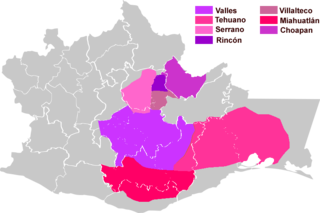In grammar, tense is a category that expresses time reference. Tenses are usually manifested by the use of specific forms of verbs, particularly in their conjugation patterns.
The imperative mood is a grammatical mood that forms a command or request.

In linguistics, agglutination is a morphological process in which words are formed by stringing together morphemes, each of which corresponds to a single syntactic feature. Languages that use agglutination widely are called agglutinative languages. For example, in the agglutinative language of Turkish, the word evlerinizden consists of the morphemes ev-ler-i-n-iz-den. Agglutinative languages are often contrasted with isolating languages, in which words are monomorphemic, and fusional languages, in which words can be complex, but morphemes may correspond to multiple features.
The subjunctive is a grammatical mood, a feature of an utterance that indicates the speaker's attitude toward it. Subjunctive forms of verbs are typically used to express various states of unreality such as wish, emotion, possibility, judgment, opinion, obligation, or action that has not yet occurred; the precise situations in which they are used vary from language to language. The subjunctive is one of the irrealis moods, which refer to what is not necessarily real. It is often contrasted with the indicative, a realis mood which principally indicates that something is a statement of fact.
Cognitivism is the meta-ethical view that ethical sentences express propositions and can therefore be true or false, which noncognitivists deny. Cognitivism is so broad a thesis that it encompasses moral realism, ethical subjectivism, and error theory.
In linguistics, a defective verb is a verb that either lacks a conjugated form or entails incomplete conjugation, and thus cannot be conjugated for certain grammatical tenses, aspects, persons, genders, or moods that the majority of verbs or a "normal" or regular verb in a particular language can be conjugated for. That is to say, a defective verb lacks forms that most verbs in a particular language have.

Spanish verbs form one of the more complex areas of Spanish grammar. Spanish is a relatively synthetic language with a moderate to high degree of inflection, which shows up mostly in Spanish conjugation.
In linguistic typology, a null-subject language is a language whose grammar permits an independent clause to lack an explicit subject; such a clause is then said to have a null subject.
Deontic modality is a linguistic modality that indicates how the world ought to be according to certain norms, expectations, speaker desires, etc. In other words, a deontic expression indicates that the state of the world does not meet some standard or ideal, whether that standard be social, personal (desires), etc. The sentence containing the deontic modal generally indicates some action that would change the world so that it becomes closer to the standard or ideal.
The jussive is a grammatical mood of verbs for issuing orders, commanding, or exhorting. English verbs are not marked for this mood. The mood is similar to the cohortative mood, which typically applies to the first person by appeal to the object's duties and obligations, and the imperative, which applies to the second person. The jussive however typically covers the first and third persons. It can also apply to orders by their author's wish in the mandative subjunctive, as in the English, "The bank insists that she repay her debt."
In linguistics, irrealis moods are the main set of grammatical moods that indicate that a certain situation or action is not known to have happened at the moment the speaker is talking. This contrasts with the realis moods. They are used in statements without truth value
The optative mood is a grammatical mood that indicates a wish or hope regarding a given action. It is a superset of the cohortative mood and is closely related to the subjunctive mood but is distinct from the desiderative mood. English has no morphological optative, but various constructions impute an optative meaning. Examples of languages with a morphological optative mood are Ancient Greek, Albanian, Armenian, Georgian, Friulian, Kazakh, Kurdish, Navajo, Old Prussian, Old Persian, Sanskrit, Turkish, and Yup'ik.
In linguistics and philosophy, modality refers to the ways language can express various relationships to reality or truth. For instance, a modal expression may convey that something is likely, desirable, or permissible. Quintessential modal expressions include modal auxiliaries such as "could", "should", or "must"; modal adverbs such as "possibly" or "necessarily"; and modal adjectives such as "conceivable" or "probable". However, modal components have been identified in the meanings of countless natural language expressions, including counterfactuals, propositional attitudes, evidentials, habituals, and generics.
This article is a description of the morphology, syntax, and semantics of Korean. For phonetics and phonology, see Korean phonology. See also Korean honorifics, which play a large role in the grammar.
In linguistics, hortative modalities are verbal expressions used by the speaker to encourage or discourage an action. Different hortatives can be used to express greater or lesser intensity, or the speaker's attitude, for or against it.
In linguistics, grammatical mood is a grammatical feature of verbs, used for signaling modality. That is, it is the use of verbal inflections that allow speakers to express their attitude toward what they are saying. The term is also used more broadly to describe the syntactic expression of modality – that is, the use of verb phrases that do not involve inflection of the verb itself.
Verbs in the Korean language come in last place in a clause. Verbs are the most complex part of speech, and a properly conjugated verb may stand on its own as a complete sentence. This article uses the Yale romanization in bold to show morphology.
Tense–aspect–mood or tense–modality–aspect is an important group of grammatical categories, which are marked in different ways by different languages.

Yatzachi Zapotec is an Oto-Manguean language of the Zapotecan branch, spoken in northern central Oaxaca, Mexico. 2,500 self-reported being Yatzachi speakers for the 1990 Mexican census, but the actual number of speakers is unknown. The Yatzachi dialect belongs to the Villa Alta group of Zapotec dialects, of which the main dialect is San Bartolomé Zoogocho. The degree of mutual intelligibility between Yatzachi and the San Bartolomé Zoogocho dialect is estimated to be around 90 percent.
Neverver (Nevwervwer), also known as Lingarak, is an Oceanic language. Neverver is spoken in Malampa Province, in central Malekula, Vanuatu. The names of the villages on Malekula Island where Neverver is spoken are Lingarakh and Limap.


